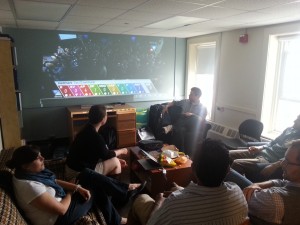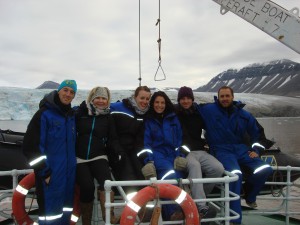Norway? Well, yes.
Suddenly my inbox is filled with notes about Norway. OK, not filled, exactly, but this sudden rush of Norway-related news is a little surprising. It started with a chat with Melanie, one of our PhD students, who spent the summer at Norway’s International Law and Policy Institute as a research fellow. But then, a second-year MALD student, Caroline, sent me this note:
I have a story I thought admissions might like for the Admissions Blog.
Last week on Monday, Eirik (one of our awesome resident Norwegians), arranged an election-watching party in Blakeley to follow the outcome of the Norwegian parliamentary elections. We watched the announcement that “Iron Erna” Solberg would become the next Norwegian prime minister. Popular Norwegian sweets were served, and some people had prepared short backgrounders on the various parties.
A reporter from Norwegian state radio NRK was present, and on September 10, her recordings became a short story on NRK radio.
You can hear the story here (in Norwegian and English): Norway elections recording(1)
And here (thanks to Eirik) is a photo of the Blakeley Hall lounge scene for Norwegian election night:
Then, Caroline reminded me that another student, Jamie (actually, a 2013 grad) had emailed me in August about a trip to Norway. Jamie wrote:
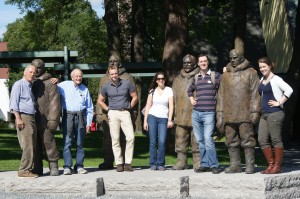 I’m currently in Oslo, Norway, with a group of seven Fletcher students and alumni for a “research trip” exploring Arctic issues from the Norwegian perspective. We are with Professor Perry (through his Institute for Global Maritime Studies) and the whole trip is funded by the Norwegian Ministry of Defense. It’s an awesome program, and we hope to establish a relationship that will enable future Fletcher students to participate each summer for years to come. We have met with government officials from the Norwegian Ministry of Defense, Ministry of Foreign Affairs, Ministry of the Environment, Ministry of Energy, and Ministry of Fisheries, in addition to a few think tanks and the World Wildlife Fund (and that was all in two days — it’s been jam packed). We also had the unique opportunity to meet the U.S. Ambassador to Norway, Ambassador Barry White, and receive a briefing from the Embassy’s Arctic expert on U.S. strategic interests in the region. And we had a lot of fun being tourists in Oslo today at the Viking Museum and the Maritime Museum. Tomorrow we fly up to Svalbard (Norway’s island in the Arctic Circle) to participate in a seminar where we will both present our research and listen to conference speakers. We even managed to organize a Fletcher alumni happy hour in Oslo yesterday, and met a new student who will be starting in the fall (now he’s really excited to start!).
I’m currently in Oslo, Norway, with a group of seven Fletcher students and alumni for a “research trip” exploring Arctic issues from the Norwegian perspective. We are with Professor Perry (through his Institute for Global Maritime Studies) and the whole trip is funded by the Norwegian Ministry of Defense. It’s an awesome program, and we hope to establish a relationship that will enable future Fletcher students to participate each summer for years to come. We have met with government officials from the Norwegian Ministry of Defense, Ministry of Foreign Affairs, Ministry of the Environment, Ministry of Energy, and Ministry of Fisheries, in addition to a few think tanks and the World Wildlife Fund (and that was all in two days — it’s been jam packed). We also had the unique opportunity to meet the U.S. Ambassador to Norway, Ambassador Barry White, and receive a briefing from the Embassy’s Arctic expert on U.S. strategic interests in the region. And we had a lot of fun being tourists in Oslo today at the Viking Museum and the Maritime Museum. Tomorrow we fly up to Svalbard (Norway’s island in the Arctic Circle) to participate in a seminar where we will both present our research and listen to conference speakers. We even managed to organize a Fletcher alumni happy hour in Oslo yesterday, and met a new student who will be starting in the fall (now he’s really excited to start!).
I was supposed to follow-up with Jamie, but I had neglected to do so, and I asked Caroline, who herself was one of the travelers, to fill in the blanks for me (and send photos!). Caroline wrote:
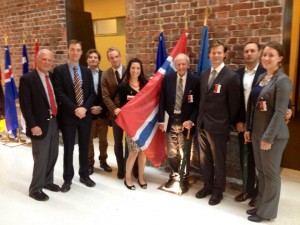 In August, as temperatures soared across the world, a group of Fletcher students, alumni, and Professor Perry traveled to Norway to learn more about the Arctic. Only hours after landing in the country, we began meetings with government officials, think tanks, and civil society, to learn more about Norway’s Arctic — the “High North.” With help from the Norwegian Atlantic Committee arranging the Oslo portion of the trip, our meetings highlighted the unique qualities of the High North, and the geopolitical concerns in the region. As a backdrop, election campaigning for the Parliamentary Elections was taking place, with party information booths in all the major centers in Oslo.
In August, as temperatures soared across the world, a group of Fletcher students, alumni, and Professor Perry traveled to Norway to learn more about the Arctic. Only hours after landing in the country, we began meetings with government officials, think tanks, and civil society, to learn more about Norway’s Arctic — the “High North.” With help from the Norwegian Atlantic Committee arranging the Oslo portion of the trip, our meetings highlighted the unique qualities of the High North, and the geopolitical concerns in the region. As a backdrop, election campaigning for the Parliamentary Elections was taking place, with party information booths in all the major centers in Oslo.
After several days of meetings, and exploration of Oslo, we boarded a plane to Svalbard, located at 78° North in the Arctic Circle. Landing in Longyearbyen, the largest settlement on Svalbard with 1,400 people, we participated in a week-long summer school conference through the University Centre in Svalbard: joining 25 young researchers from across the globe, who specialize in subjects ranging from political science to climatology, and all with research on the Arctic. The summer school featured talks by Arctic experts, and debates about the future of shipping in the Arctic. Taking an interdisciplinary approach, the conference was designed to capitalize on dialogues formed between representatives of different disciplines during their time together. Together, we produced a report based on our findings. In the report writing process, our Fletcher skill set came to be very useful, as we managed the process and helped with the synthesis of different fields.
Abandoned mines and mining infrastructure dotted the treeless, sparse landscape of Svalbard. The permafrost landscape was experiencing its long, but cold, summer, illuminated in the middle of the night by the midnight sun. During the week in Svalbard, we took the opportunity to explore by going on long hikes and excursions, always with a person who carried a loaded rifle in case we might encounter a dangerous, hungry polar bear. One excursion took everyone to the abandoned Russian mining town of Pyramiden, and a nearby glacier.
We also met with some previous Fletcher graduates. The incoming class of Norwegian diplomats, which includes three recent Fletcher alumni, was in Svalbard as part of a tour of Norway. One evening, gathered at one of the four bars in Longyearbyen, five generations of Fletcher shared a drink. Even in the Arctic, you are never far from Fletcher!
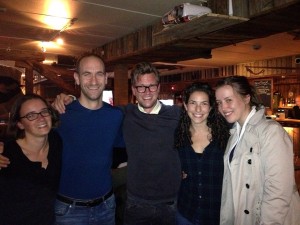
The trip was incredibly valuable for several reasons. First, it provided context to what we had read and heard about the Arctic, especially in understanding the low risk for conflict in the region. Second, we were able to talk to the current and future generations of key thinkers about the Arctic. And finally, we will be sharing what we learned with the Fletcher community in a presentation later this year. Through this first-hand learning experience, we now better understand the opportunities emerging in this corner of the world and how the Fletcher education can help us tackle the Arctic’s most complex challenges.
It all sounds fantastic, and until I heard from Jamie and Caroline, I had no idea this trip was taking place, and I always appreciate it when students keep me informed. Who knows what country or topic will be taking over my inbox next!
